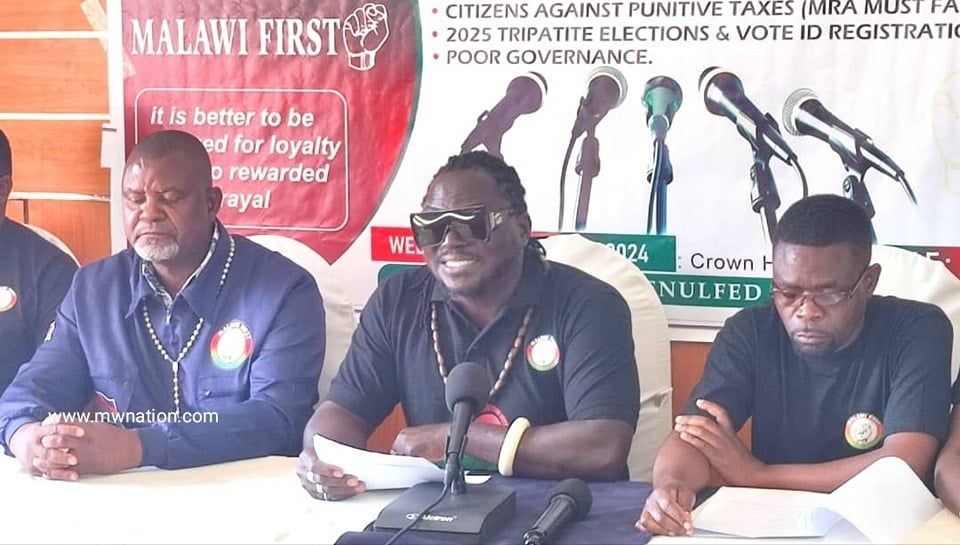By Burnett Munthali
The pressure group Malawi First, also known as The People First, has recently announced its intention to organize nationwide demonstrations against several key institutions: the Malawi Electoral Commission (MEC), the Malawi Revenue Authority (MRA), and the National Registration Bureau (NRB). The group’s leader, Bon Kalindo, made this declaration during a press conference in Lilongwe, citing significant concerns over electoral registration processes and new tax measures.
Concerns raised by Malawi First
1) The MRA’s new initiative involves implementing excise tax stamps on various products. The goal is twofold: to enhance revenue collection and to deter the consumption of goods deemed hazardous to health. However, Malawi First argues that this tax measure could adversely impact businesses. The group contends that the implementation of these stamps might increase operational costs and reduce consumer spending. As a result, they are calling for a suspension of the new tax measures to allow for further consultation and dialogue with stakeholders.
2) The group has expressed strong opposition to the use of national identity cards for electoral registration. They argue that national ID cards may not be the most reliable or inclusive method for voter registration. Instead, Malawi First advocates for alternative documentation methods, such as birth certificates, to ensure a more comprehensive and accessible registration process. Their concern centers around the potential exclusion of eligible voters who might face difficulties with the national ID system.
Demands and timeline
Bon Kalindo, reading from a prepared statement, issued a clear ultimatum to the MRA, NRB, MEC, and the Malawi Government. Malawi First is demanding that these entities address their concerns within a 10-day period. If the issues are not resolved to their satisfaction, the group has vowed to escalate their actions by organizing nationwide demonstrations.

Implications and reactions
If Malawi First’s concerns regarding the excise tax stamps are valid, businesses could face increased costs and operational challenges. This may prompt broader discussions about tax policy and its effects on the economy.
The debate over electoral registration methods raises questions about electoral integrity and inclusivity. The effectiveness and fairness of using national ID cards versus alternative documentation could significantly impact voter participation and confidence in the electoral process.
The government and the affected institutions will need to address these issues promptly to avoid potential unrest. Engaging with stakeholders and addressing their concerns may help mitigate the need for demonstrations and foster a more collaborative approach to policy implementation.
In conclusion, Malawi First’s warning of impending demonstrations highlights the tension between government policies and public sentiment. The group’s objections to the excise tax stamps and the use of national ID cards for electoral registration underscore broader concerns about the impact of these measures on businesses and electoral inclusivity. As the 10-day deadline approaches, the response from the MRA, NRB, MEC, and the government will be crucial in determining whether these issues can be resolved through dialogue or if demonstrations will become a reality.


